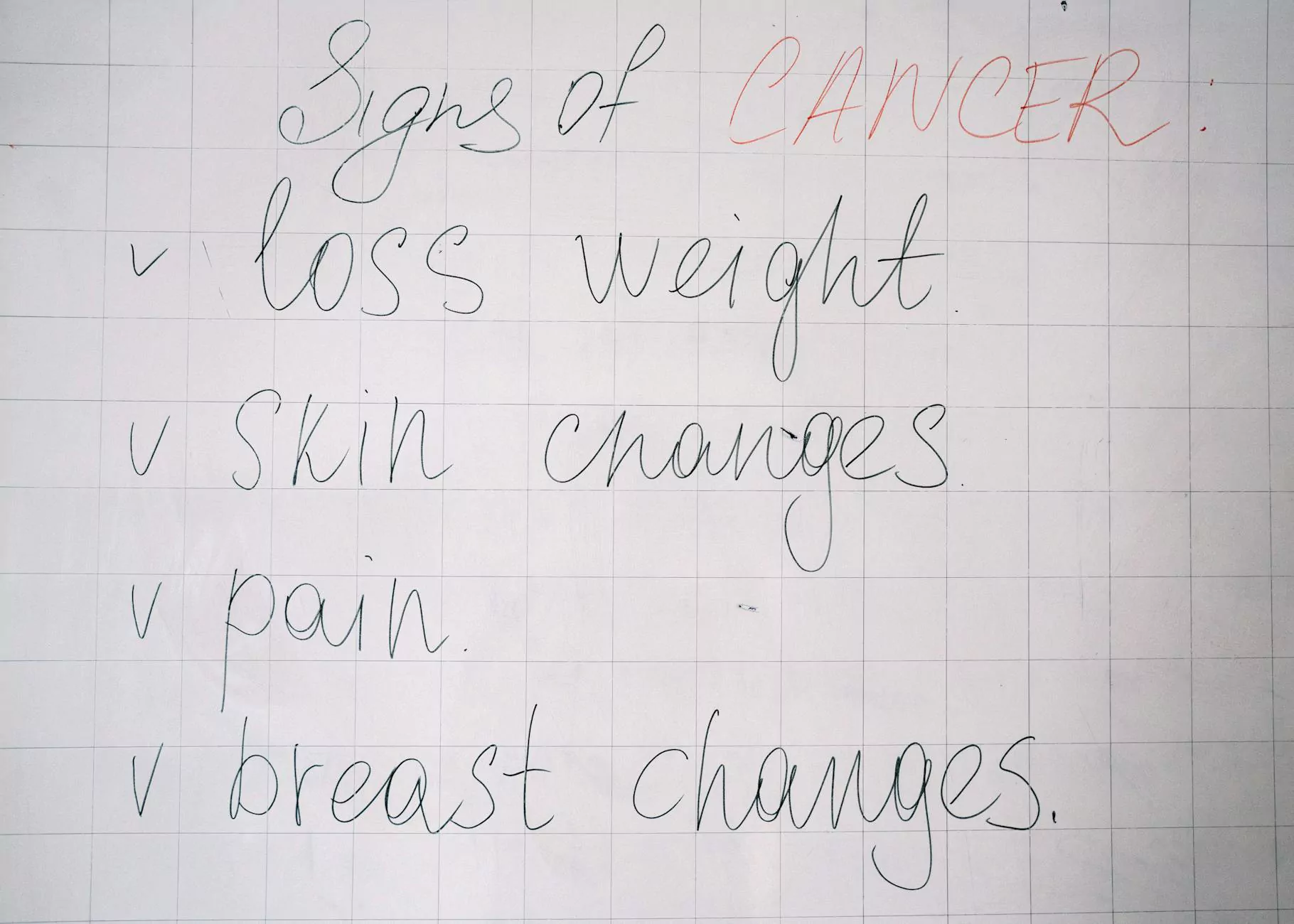Understanding the Early Signs of Lung Cancer in Non-Smokers

Lung cancer has often been associated with smoking; however, a significant number of lung cancer cases occur in non-smokers. It is crucial to recognize the early signs of lung cancer in non-smokers to facilitate timely diagnosis and treatment. This extensive guide will help you understand these early warning signs, the risk factors involved, and what steps you can take to advocate for your health.
What is Lung Cancer?
Lung cancer originates in the lungs and can spread to other parts of the body if not diagnosed and treated in time. There are two primary types of lung cancer: non-small cell lung cancer (NSCLC) and small cell lung cancer (SCLC). While smoking is the leading cause of lung cancer, approximately 20% of lung cancer patients have never smoked. This article casts light on the early signs of lung cancer in non-smokers, emphasizing the need for awareness even amongst those who do not partake in tobacco use.
Why Early Detection is Essential
Detecting lung cancer early significantly improves the chances of successful treatment. Early-stage lung cancer may show few or no symptoms, making it challenging to diagnose. As such, understanding the early signs can lead to prompt medical consultation and intervention.
Statistics on Lung Cancer in Non-Smokers
According to the American Lung Association:
- Nearly 48,000 lung cancer deaths occur annually among non-smokers in the United States.
- The proportion of lung cancer cases in non-smokers has been reported to be increasing.
- Women are more likely than men to develop lung cancer even without a history of smoking.
Common Early Signs of Lung Cancer in Non-Smokers
Recognizing the early signs of lung cancer in non-smokers can be a matter of life and death. Here are some of the key symptoms to watch for:
1. Persistent Cough
A chronic cough that does not go away or worsens over time can be one of the most significant warning signs. If you find that your cough is persisting beyond three weeks, it is essential to consult a healthcare provider.
2. Shortness of Breath
Unexplained shortness of breath, particularly if it occurs during regular activities or at rest, could signal lung issues. This symptom may develop due to blockages in the airways or inflammation in the lungs.
3. Chest Pain
Any persistent chest pain while laughing, coughing, or breathing could indicate lung cancer. It's vital to differentiate this pain from other conditions by seeking medical advice.
4. Changes in Phlegm
Changes in the color, consistency, or volume of sputum (phlegm) can also be an early sign. If you notice blood in your sputum, this warrants immediate medical attention.
5. Fatigue
Persistent fatigue, characterized by an ongoing feeling of tiredness or lack of energy that doesn’t improve with rest, could be related to lung cancer. This symptom can often be overlooked, but it is essential to pay attention to your body.
6. Weight Loss
Unexplained weight loss without trying could indicate serious health issues, including lung cancer. If you're not actively dieting or increasing physical activity and notice weight loss, consider discussing it with a physician.
7. Frequent Respiratory Infections
Recurrent respiratory infections, such as bronchitis or pneumonia, may indicate the presence of an underlying health issue, including lung cancer. If you find yourself frequently battling these conditions, it's essential to see a doctor.
Understanding Risk Factors for Lung Cancer in Non-Smokers
While non-smokers are at a lower risk for lung cancer, several risk factors can elevate that risk. Understanding these factors can aid individuals in making informed health choices.
1. Exposure to Secondhand Smoke
Living with or spending time around a smoker puts you at risk of secondhand smoke exposure, which is known to increase lung cancer risk even for those who never smoke.
2. Radon Gas Exposure
This naturally occurring gas from the earth can accumulate in homes, particularly basements. High levels of radon exposure are linked to increased lung cancer risk.
3. Occupational Hazards
Occupational exposure to carcinogens such as asbestos, arsenic, and certain chemicals in industries like construction, manufacturing, and mining elevates lung cancer risk.
4. Family History
If lung cancer runs in your family, your risk may be higher. Genetic factors can contribute to the susceptibility to lung cancer.
5. Previous History of Lung Conditions
Individuals with a history of lung conditions such as COPD (Chronic Obstructive Pulmonary Disease) or previous lung infections are at a higher risk of developing lung cancer.
Preventive Measures and Strategies
While not all cases of lung cancer can be prevented, adopting certain strategies can help reduce your risk significantly.
1. Regular Health Screenings
Annual health check-ups and screenings, particularly for individuals over 50 or those with risk factors, can facilitate early detection of potential issues.
2. Home Radon Testing
Testing your home for radon and taking corrective measures if levels are high can mitigate risks associated with radon exposure.
3. Avoiding Secondhand Smoke
Do your best to avoid places where smoking is prevalent. Consider advocating for smoke-free environments in your community.
4. Healthy Lifestyle Choices
Engaging in regular physical activity, maintaining a balanced diet rich in fruits and vegetables, and managing stress can contribute to overall lung health.
5. Stay Informed on Occupational Risks
If you work in an industry with known risks for lung health, ensure you are following all safety protocols and using protective equipment.
Conclusion: Taking Charge of Your Lung Health
Knowledge about the early signs of lung cancer in non-smokers can empower you to take charge of your lung health. Stay vigilant and consult your healthcare provider if you notice any unusual symptoms. Early detection can lead to more effective treatment options, increasing survival rates and quality of life. Empower yourself by staying informed, engaging in preventive health measures, and advocating for regular health screenings.
Reach Out to Neumark Surgery
If you or a loved one are experiencing any of the early signs of lung cancer in non-smokers, we encourage you to contact Neumark Surgery. Our team of experts is dedicated to helping you navigate your concerns and provide comprehensive medical care. Remember, early detection and intervention are your best allies in the fight against lung cancer.
early signs lung cancer non smoker








